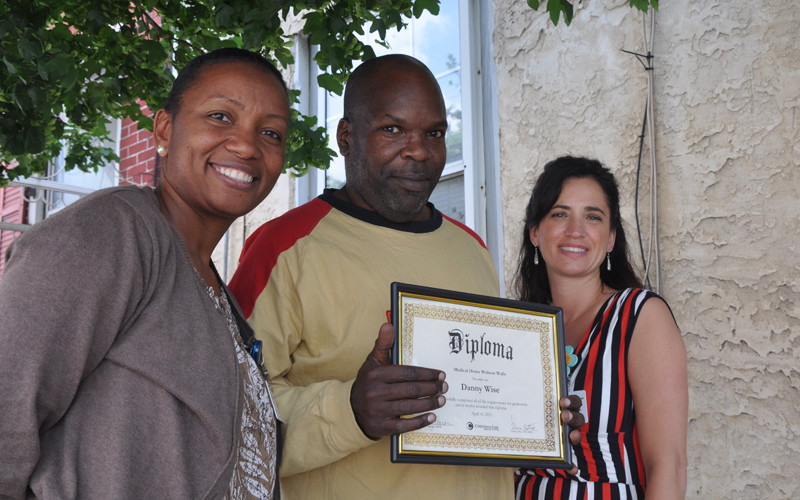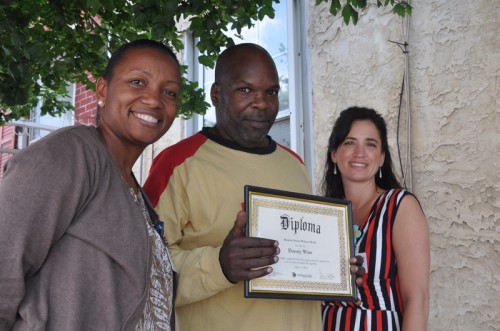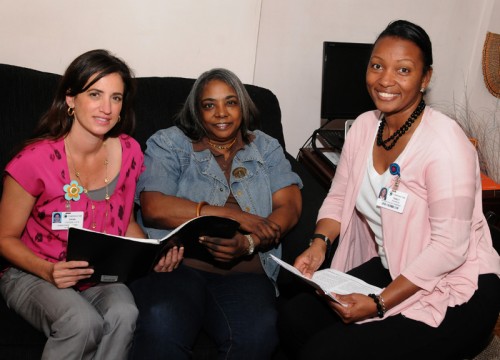Medical Home Without Walls gets patients back on their feet


For 21 years, Sharon Stokes was an executive secretary at a bank, with good medical benefits and ready access to health care.
But she was unable to find another full-time position after her employer downsized in 2007 and she lost both her job and her medical insurance. Her health declined, too, as she developed diabetes, hypertension and problems with her heart, gallbladder and feet.
By February 2013, Stokes had been hospitalized several times and transported by ambulance twice to her daughter’s third-floor apartment after she was discharged, because the 61-year-old grandmother of four was unable to climb the stairs.
To help her break this painful, frustrating cycle, her doctor at Wilmington Hospital’s Adult Medicine practice, Joseph Deutsch, M.D., recommended her for Medical Home Without Walls, an innovative program that engages hospital “super users,” defined as the fewer than 10 percent of patients who account for more than 20 percent of visits to the hospital.

The goal of the program is to identify people who need extra help and connect them with a multidisciplinary team that coordinates their medical care, as well as psychological and social needs such as food, housing and transportation. Since its launch at the end of 2012, the program has enrolled more than 50 patients in New Castle County who do not have health insurance. Some of them are homeless.
Stokes was not a super user. But with multiple health problems and a lack of mobility she was at risk of becoming one.
“Dr. Deutsch called me and said ‘we are going to make sure you get back on your feet,’” she said. “Then he sent me these beautiful women from Medical Home Without Walls.”
Stokes met with Diane Bohner, M.D., medical director of Patient and Family Centered Care and Resource Management at Christiana Care; Dana Cortese, an advanced practice nurse; and Tracy Pearson, a social worker and health coach.
Together, they came up with a plan of action to keep Stokes healthy at home and out of the hospital, a strategy that would improve her quality of life and reduce her health care costs.
“They truly care about me,” Stokes said. “Never critical, never judgmental, always kind.”
Walking was at the top of her list of goals. The team referred her to a podiatrist, who treated arthritis in her feet, the first step to regaining her mobility. Pearson connected her with the Community Healthcare Access Program (CHAP), which helps uninsured people with primary care, tests and medications. She also located a program at ShopRite that enabled Stokes to get one of her prescriptions for free.
Each time the team met, Cortese would take Stokes’ blood pressure and make certain she was taking her medications properly. The team worked with her to establish personal goals that included losing weight and getting back to work. Pearson helped Stokes to restructure her resume to highlight accomplishments that will be attractive to a prospective employer.
Stokes became an active partner in her care, eager to learn more about ways she could improve her health.
“When we would arrive at her appointments, she was already there, waiting for us,” Pearson said.
Providing expert, compassionate care in ways patients value is The Christiana Care Way. Patients enrolled in the Medical Home Without Walls receive help based on their individual needs, which might include a ride to a doctor’s office or a referral to a food bank or a shelter.
For 48-year-old Danny Wise of Wilmington, who spent three months in the hospital after suffering a series of strokes, the help he needed was largely financial.
“I had stopped taking my blood pressure medicine after I lost my job,” he said.
The Medical Home Without Walls team helped him to contact various health care providers to ask for assistance in paying his medical bills through charity-care programs.
Pearson provided Wise with the information, but it was up to him to make the calls. She also helped him to apply for Medicaid, ensuring his access to medications and care.
After only four months, Stokes and Wise are among the first graduates of Medical Home Without Walls. Neither has been hospitalized since they started working with the team.
They have learned how to take responsibility for their own care. But Pearson calls each Friday, just in case someone has a question or needs help.
“They said they would get me back on my feet, and they did,” Stokes said. “Now, when I visit my daughter, I can walk those three flights of stairs.”